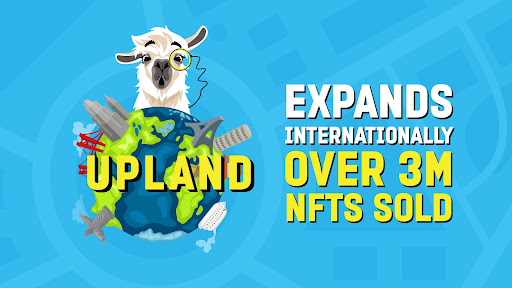Upland, the layer-1 metaverse that allows you to mint and own properties that mirror the real world, expands internationally into Rio de Janeiro, Brazil and Porto, Portugal. The growth in land offering outside of the United States comes as demand grows within the Upland community, with over 280,000 unique land owners. This heralds the beginning of a worldwide virtual property and partnerships expansion.
The Upland economy
Nearly everyone has played Monopoly before, the property game that allows players to build up their real estate portfolio and increase property value with its development. Upland is Monopoly on steroids.
The gamified experience enables players to buy virtual properties on the Blockchain in various cities across the United States, and now in Rio de Janeiro, Brazil and Porto, Portugal. The utility of the properties stem from the economic opportunity provided by the Upland metaverse platform.
Properties earn a return and fees from visitors, and can be traded. You can acquire various properties in a neighbourhood in order to form “Collections” that make a much higher return. To date, Uplanders have collectively earned more than $7 million in the Upland metaverse, and in 2021 alone, players reported anywhere between 600% to as much as a 1.6 million percent increase in their Upland net worth.
As a layer-1, Upland provides different ways for entrepreneurs, contributors and brands to operate. Users can earn an income in Upland by setting up businesses called “metaventures”, such as showrooms on their properties, or factories that produce UGC NFTs sold to the community. Developers of new or existing apps leverage Upland as a discoverability platform and set up shop.
The Upland vision is to build the foundations so that thousands of micro-entrepreneurs will exist alongside the big brands, and make an income by selling virtual assets or services to fellow Uplanders.
From San Francisco to Rio de Janeiro
San Francisco, the first Upland city, started in open beta for the web, IOS, and Android back in January of 2020. Since that time Upland has been in a non-stop expansion, spreading to many cities across the United States, and now linking across the ocean to the vibrant and colourful city of Rio de Janeiro in Brazil and the historic city of Porto, Portugal.
All Upland cities are mapped out to real world addresses. So buying a property in Rio makes you the owner of the virtual double of that property in the exact same geographical location.
By constantly entering the Upland metaverse, an ‘Uplander’ gets to really know the neighbourhoods of the cities that they build their portfolio within. In a newly released feature, property owners can set up a “home address” on one of their properties, which will give them the right to vote on neighbourhood and platform-wide referendums. The governance activity is meant to empower the Upland community, and local communities.
Porto and soccer in the Upland metaverse
Upland’s next move is into Europe. Porto in Portugal to be precise. Throughout the architecturally beautiful city of Porto, properties will be mapped to their real world locations, and Uplanders can buy properties and soon, football player Legits from the 2022/2023 FC Porto team.
A brand partner for Upland, FC Porto is the premier team in Portugal, and the current champion of the Primeira Liga. The first phase of the partnership will include the build of the Estadio do Dragao stadium and the launch of the first soccer club NFTs in Upland.
The Upland metaverse is embarking on the next step of its product offering on the path to platformization. The growth of Upland into new cities and with new partnerships is driven by the growth of its user-base. This growth, in turn, drives the expansion of economic activity – also driven by the community’s contributors and entrepreneurs, as well as new platform products and features such as manufacturing, cars and UGC assets.
In June, the team delivered developer tools to allow partners, existing applications and community developers to use Upland as a layer-1 and engage with its economy and community. Expanding together, these vertical and horizontal growth initiatives are leading the Upland vision of an open, entrepreneurial and user-driven economy.
Disclaimer: This article is provided for informational purposes only. It is not offered or intended to be used as legal, tax, investment, financial, or other advice.
